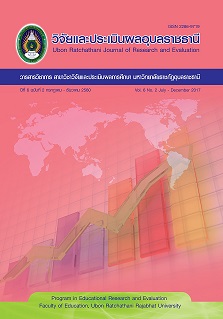การพัฒนาความสามารถในการแก้ปัญหาของเด็กปฐมวัย โดยใช้แผนการจัดกิจกรรมวิทยาศาสตร์สำหรับเด็กปฐมวัย 31-40
คำสำคัญ:
กิจกรรมวิทยาศาสตร์, ความสามารถในการแก้ปัญหา, เด็กปฐมวัยบทคัดย่อ
การวิจัยครั้งนี้มีวัตถุประสงค์เพื่อศึกษาระดับและเปรียบเทียบความสามารถในการแก้ปัญหาของเด็กปฐมวัยโดยใช้แผนการจัดกิจกรรมวิทยาศาสตร์ ตัวอย่างที่ใช้ในการวิจัยครั้งนี้เป็นเด็กปฐมวัยชาย-หญิง อายุ 5-6 ปี ที่กำลังศึกษาอยู่ในชั้นอนุบาลปีที่ 2 ภาคเรียนที่ 1 ปีการศึกษา 2560 โรงเรียนบ้านดงแถบ อำเภอโขงเจียม จังหวัดอุบลราชธานี ได้มาโดยวิธีการเลือกแบบเจาะจง เพื่อจัดกิจกรรมวิทยาศาสตร์ ใช้เวลา 4 สัปดาห์ ๆ ละ 5 วัน วันละ 30 นาที รวมทั้งสิ้น 20 ครั้ง เครื่องมือที่ใช้ในการวิจัยครั้งนี้ คือ แผนการจัดกิจกรรมวิทยาศาสตร์สำหรับเด็กปฐมวัย และแบบวัดความสามารถในการแก้ปัญหาของเด็กปฐมวัย ที่ผู้วิจัยสร้างขึ้น มีค่า IOC เท่ากับ 0.67-1.00 มีค่าความเชื่อมั่น เท่ากับ 0.80 แบบแผนการวิจัยใช้แบบ The One-Group Pretest-posttest Design วิเคราะห์โดยใช้ค่าเฉลี่ย ส่วนเบี่ยงเบนมาตรฐาน และ t-test แบบ Dependent Sample
ผลการวิจัยพบว่า เด็กปฐมวัยที่ได้รับการจัดกิจกรรมวิทยาศาสตร์มีความสามารถในการแก้ปัญหาโดยรวม หลังการทดลองสูงกว่าก่อนการทดลอง อย่างมีนัยสำคัญทางสถิติที่ระดับ .01 และความสามารถในการแก้ปัญหารายด้าน ได้แก่ ด้านการแก้ปัญหาของตนเองที่ไม่เกี่ยวข้องกับผู้อื่น ด้านการแก้ปัญหาของตนเองที่เกี่ยวข้องกับผู้อื่น ด้านการแก้ปัญหาของผู้อื่นที่เกี่ยวข้องกับตัวเด็ก และด้านการแก้ปัญหาของผู้อื่น ของเด็กปฐมวัย หลังจากทดลองสูงกว่าก่อนการทดลอง อย่างมีนัยสำคัญทางสถิติที่ระดับ .01
เอกสารอ้างอิง
. การส่งเสริมความสามารถในการคิดแก้ปัญหาสำหรับเด็กปฐมวัย. กรุงเทพฯ: มหาวิทยาลัย
ศรีนครินทรวิโรฒ, 2547.
เกรียงศักดิ์ เจริญวงศ์ศักดิ์. การคิดเชิงกลยุทธ์. กรุงเทพฯ: ซัคเซส มีเดีย, 2546, อ้างถึงใน อัญชลี ไสยวรรณ. การศึกษาเปรียบเทียบผลของการจัดประสบการณ์แบบปฏิบัติการทดลองกับแบบผสมผสานที่มีต่อทักษะกระบวนการวิทยาศาสตร์ของเด็กปฐมวัย. ปริญญานิพนธ์การศึกษามหาบัณฑิต มหาวิทยาลัย
ศรีนครินทรวิโรฒ ประสานมิตร, 2531.
คณะกรรมการการประถมศึกษาแห่งชาติ, สำนักงาน. การจัดกิจกรรมวิทยาศาสตร์ไม่ว่าจะใช้การสอนแบบใดก็ตามครูต้องตัดสินใจเลือกให้เหมาะสมกับสภาพแวดล้อมในห้องเรียน. กรุงเทพฯ: โรงพิมพ์คุรุสภาลาดพร้าว, 2541.
ทิศนา แขมมณี และคนอื่น ๆ. “การเรียนรู้เพื่อพัฒนากระบวนการคิด,” ครุศาสตร์. 26,1 (กรกฎาคม-ตุลาคม 2540): 35-60.
นิตยา คชภักดี. จิตเวชเด็กสำหรับกุมารแพทย์. กรุงเทพฯ: คณะแพทย์ศาสตร์, 2530.
ประพันธ์ศิริ สุเสารัจ. คิดเก่ง สมองไว. กรุงเทพฯ: โปรดั๊กทีฟ บุ๊ค, 2541.
พรรณี ช.เจนจิต. จิตวิทยาการเรียนการสอน. กรุงเทพฯ: ต้นอ้อ แกรมมี่, 2538.
เยาวพา เดชะคุปต์. การจัดการศึกษาสำหรับเด็กปฐมวัย. กรุงเทพฯ: แม็ค, 2540.
อภิรตี สีนวล. ความสามารถในการแก้ปัญหาของเด็กปฐมวัยที่ได้รับการจัดกิจกรรมเล่านิทานฉงน.
ปริญญานิพนธ์การศึกษามหาบัณฑิต สาขาวิชาการศึกษาปฐมวัย มหาวิทยาลัยศรีนครินทรวิโรฒ, 2547.
อรพรรณ พรสีมา. ทักษะการคิดและแก้ปัญหาของเด็กปฐมวัยที่ได้รับประสบการณ์ใช้โครงสร้างระดับยอด. ปริญญานิพนธ์การศึกษามหาบัณฑิต สาขาวิชาการศึกษาปฐมวัย มหาวิทยาลัยศรีนครินทรวิโรฒ, 2543.
อุทัย ดุลยเกษม. ศึกษาเรียนรู้. กรุงเทพฯ: มูลนิธิสดศรี-สฤษดิ์วงศ์, 2542.
Bruner, J. S. Students in Cognitive Growth a Collaboration at the Center for Cognitive Studies. New York: John Wiley & Sons, 1966.
Bruner, Geneva. The Process of Education. New York: Harvard University Press, 1976.
ดาวน์โหลด
เผยแพร่แล้ว
รูปแบบการอ้างอิง
ฉบับ
ประเภทบทความ
สัญญาอนุญาต
1. บทความที่ตีพิมพ์ในวารสารนี้ได้มีการตรวจสอบการลอกเลียนงานวรรณกรรมแล้ว ไม่เกินร้อยละ 25
2. บทความที่ตีพิมพ์ในวารสารนี้เป็นข้อคิดเห็น ข้อค้นพบของผู้เขียนบทความ โดยผู้เขียนบทความต้องเป็นผู้รับผิดชอบต่อผลทางกฎหมายใด ๆ ที่อาจเกิดขึ้นจากบทความนั้น ๆ
3. บทความ ข้อมูล เนื้อหา รูปภาพ ฯลฯ ที่ได้รับการตีพิมพ์ในวารสารวิจัยและประเมินผลอุบลราชธานี ถือเป็นลิขสิทธิ์ของวารสารวิจัยและประเมินผลอุบลราชธานี หากบุคคลหรือหน่วยงานใดต้องการนำทั้งหมดไปเผยแพร่ต่อหรือเพื่อกระทำการใดๆ จะต้องได้รับอนุญาตเป็นลายลักษณ์อักษรจากวารสารวิจัยและประเมินผลอุบลราชธานีก่อนเท่านั้น และจะต้องมีการอ้างอิงวารสารวิจัยและประเมินผลอุบลราชธานี ฉบับนั้น ๆ ด้วย






